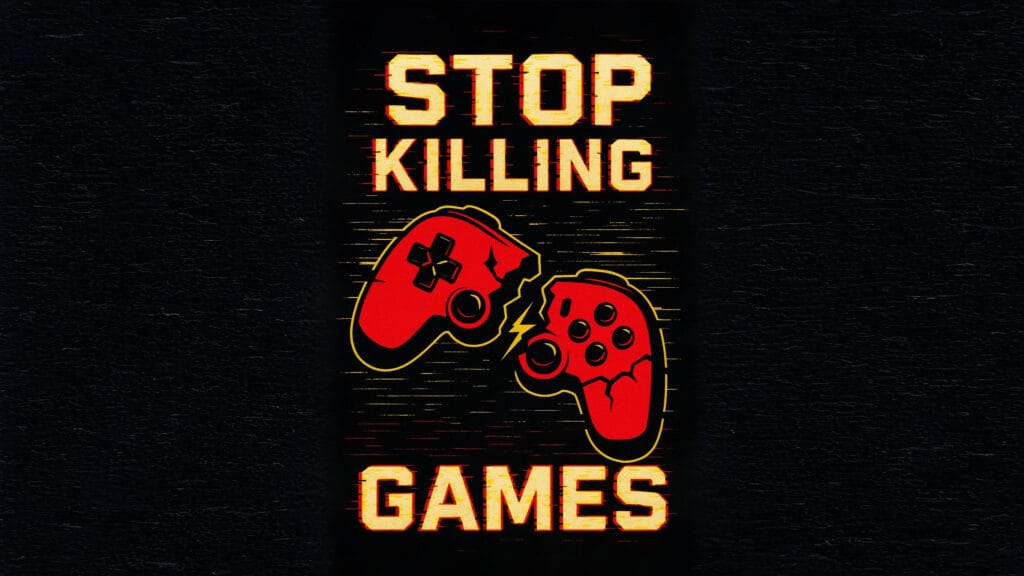The idea that video games are simply a hobby for recreational enjoyment cannot stand up to the cultural transformation underway today — a transformation quietly reshaping the rules of ownership, creativity, and consumer rights.
At the center of this shift is a burgeoning global movement: Stop Killing Games. Why? Because what started as scattered online protests over publishers shutting down servers and rendering paid-for games unplayable has snowballed into a wider debate about digital ownership, artistic preservation, and the future of interactive media.
The Fight for Digital Rights
As the years went on, people discovered there was little they could do once a game’s online support ended. Even after legally purchasing a title, servers would shut down, multiplayer features would disappear, and sometimes entire games would stop functioning. It didn’t sit well.
As favorite titles began to vanish suddenly — often without notice — fans started asking the hard, long-avoided questions:
- Why is something you paid for taken away from you?
- If we can preserve books, movies, and artwork, why can’t we preserve video games?
- Why should companies get to decide when something you purchased no longer exists?
The Stop Killing Games campaign gained momentum by giving frustrated gamers a platform to voice their anger. Petitions, viral posts, and hashtags flooded social media, calling for publishers to respect consumers’ right to access the content they paid for. Online forums filled with stories of people losing their childhood games, multiplayer memories, or entire digital libraries overnight.
And to some extent — it worked.
In several cases, companies reversed shutdown decisions or released offline patches allowing games to remain accessible after servers were taken down. More importantly, it sparked meaningful conversations in gaming communities, tech conferences, and legal circles about what it truly means to own something in the digital world.
Games as Cultural Artifacts
Beyond consumer rights, this controversy reveals a powerful — yet frequently overlooked — truth: video games are cultural artifacts of the contemporary world.
If a film studio publicly announced plans to erase every vintage film tomorrow, the world would be outraged. There’d be editorials, protests, and campaigns to preserve those works.
So why is it acceptable to erase a game — with all its narrative, music, visuals, mechanics, and player memories? Why should it be treated differently?
Games like Journey, Disco Elysium, The Witcher 3, and The Last of Us aren’t just entertainment. They’re interactive cultural works, capturing what a particular era feared, valued, and imagined. Their disappearance isn’t just a loss to gamers — it’s a theft from cultural history.
Stop Killing Games made this truth harder to ignore. It proved people care about preserving digital art and defied the outdated assumption that games are childish, shallow, or culturally insignificant.
Why It Matters More Than Ever
Some might dismiss this as collector’s pride or nostalgia — but it’s much bigger than that. The way we treat games today will decide how we handle all forms of digital media tomorrow.
What happens to your favorite eBooks, films, albums, or online-only apps when the servers go offline? What about games never released on physical media but existing solely as digital files under corporate control?
Unless we fight for the right to ownership and preservation now, corporations will continue deciding how long art, ideas, and personal experiences are allowed to exist. Future generations could miss out on entire creative eras simply because those works were no longer considered profitable.
A Cultural Shift Already Underway
This issue is no longer niche — it’s already making waves:
- Gamers across platforms and genres are rallying behind one cause.
- Lawmakers in some countries are beginning to review digital consumer rights and ownership laws, as preservation advocates call for legislation to guarantee continued access to purchased content.
- Media coverage and commentary are framing this as part of a wider debate on digital capitalism, cultural control, and preservation in the 21st century.
Though the fight is far from over — and may take years — one fact is clear: video games are no longer just games. Their storytelling, visuals, and cultural impact are worthy of protection and respect, just like any other form of art.
Final Thought
Stop Killing Games isn’t just a battle cry. It’s an appeal to anyone who cares about what they purchase, the art they enjoy, and the culture they help shape.
Because at its core, this isn’t just a gaming issue.
It’s about whether we’re prepared to stand up for our rights in a digital world.



